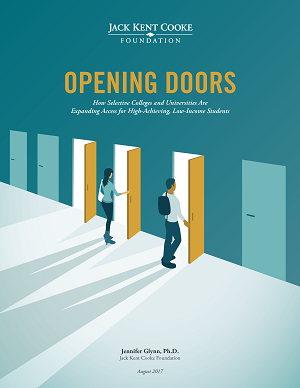Report Documents Troubling Statistics for Low-Income Students Applying to Nation’s Top Colleges
Unlike their more affluent peers, nearly one-in-four low-income students apply to college without the support of a parent or counselor; nearly half never visited their top choice school
FOR IMMEDIATE RELEASE
Thursday, August 17, 2017
Media Contact: Amber Styles
703-723-5647
media@jkcf.org

LANSDOWNE, Va. – America’s elite colleges and universities can increase the number of high-achieving, low-income students who attend by taking simple steps to reduce burdensome fees and improve transparency, according to a new report released today, by the Jack Kent Cooke Foundation.
The report, titled “Opening Doors: How Selective Colleges and Universities Are Expanding Access for High-Achieving, Low-Income Students” includes findings from a survey of over 2,500 high school seniors from low-income backgrounds that had a GPA above 3.8 and SAT or ACT scores in the top 15 percent nationwide.
According to the report, concerns about college costs, including room and board, discourage one in three (34 percent) of high-achieving, low-income students from applying to any college. Nearly half (44 percent) of these students never visit their top choice school, and almost one in four (23 percent) apply with no help from parents, teachers, or counselors.
In addition to identifying common challenges, “Opening Doors” provides a road map for how America’s top colleges can reverse the trend, calling on selective institutions to learn from the best practices of elite colleges that have already opened their doors wider to outstanding low-income students.
“For generations, higher education served as a springboard to social mobility, offering a gateway to the American Dream. Sadly, that dream is no longer a reality for the many students in financial need,” said New York Times best-selling author, Jeff Selingo, who provided the new report’s foreword. “The demographics of today’s college students are diverse and changing. Colleges and universities must evolve to meet their needs, and this report provides a road map.”
The 14 step-action plan calls on elite colleges to simplify the process of applying for admission, recognize the obstacles low-income students face in evaluating them for admission, and remove admissions practices disadvantaging low-income students. These and several other recommendations are based on proven actions taken by five institutions that were finalists for the 2016 Cooke Prize for Equity in Educational Excellence: Amherst College, Davidson College, Pomona College, Rice University and Stanford University.
“Far too often, students with high intelligence and abilities are locked out of elite colleges because they have financial need,” said Cooke Foundation Executive Director and Former New York City Schools Chancellor, Harold O. Levy. “This is tragic, not just for the students but for our nation because it deprives us of the full measure of their talents.”
“Opening Doors” was written by Dr. Jennifer Glynn, director of research and evaluation at the Cooke Foundation. The report is available for download on the Foundation website here.
# # #
About the Jack Kent Cooke Foundation
The Cooke Foundation is dedicated to advancing the education of exceptionally promising students who have financial need. Since 2000, the foundation has awarded $175 million in scholarships to more than 2,300 students from 8th grade through graduate school, along with comprehensive counseling and other support services. The foundation has also provided over $97 million in grants to organizations that serve such students. www.jkcf.org
